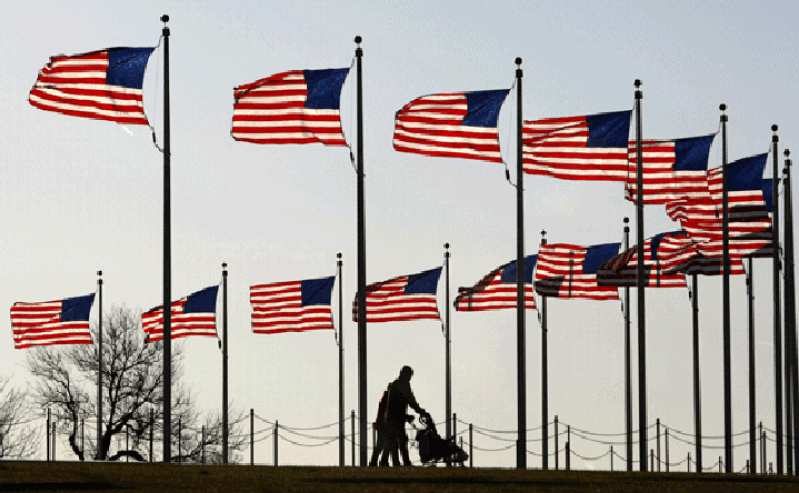
There has been debate in the United States over whether or not the country was historically founded as a "Christian nation" that has a special relationship with God. A new survey indicated that there are concerns about the status of the country as a whole.
In a June 23 survey conducted by Public Religion Research Institute, or PRRI, about 62 percent of Americans believed that God has granted America a special role in human history, while 33 percent disagreed. The survey also looked at the breakdown of this question based on political ideology and religious affiliation.
"Conservatives are nearly twice as likely as liberals to agree that God has granted the U.S. a special role in human history- 80 percent of conservatives and only 45 percent of liberals agree with this statement," PRRI wrote. "Half (50 percent) of liberals reject the notion that the country has a divinely sanctioned role in human history."
When it comes to affirming American exceptionalism, PRRI noted that more than 83 percent of white evangelical Protestants agreed that God has granted the U.S. a special role in human history, compared with 73 percent of non-white Protestants, 70 percent of Catholics and 56 percent of white mainline Protestants. However, 53 percent of "religiously unaffiliated Americans" disagreed with that notion, while 39 percent agreed.
"Americans are proud of their national identity," PRRI wrote. "In fact, few Americans report a time when they were not proud to be an American."
PRRI research director Daniel Cox told Cathy Lynn Grossman of Religion News Service that "American exceptionalism is a deep and abiding relief that's fundamental to the American DNA." However, the survey also asked if Christians, which make up 72 percent of the adult population in the U.S., faced as much discrimination as other groups.
"Christians feel like they are swimming against a cultural tide that's rising against them," Cox said.
Based on what PRRI found, 49 percent of those surveyed said yes to the notion that Christians faced discrimination in the U.S.; 70 percent of white evangelicals made that assertion. However, 47 percent said no.
When asked if the U.S. could still be considered a "Christian nation," PRRI found that 45 percent of Americans believed that the country was once a Christian nation but not anymore, while 35 percent believed it still was a Christian nation; only 14 percent claimed the U.S. never had that status. Spring Arbor University professor Mark Edwards questioned that notion in an article published by CNN.
"If we are talking about 13 colonies belonging to the British Empire, whose king presided over an imperial church, then yes, British citizens residing in those colonies lived under Christian rule," Edwards wrote. "Those colonies were founded as outposts of a Christian nation. With American independence, however, the British monarchy lost control over its American subjects."
According to Edwards, answering the question "Is America a Christian nation?" would depend on the perspective. He thought the answer was a solid "no" in terms of whether or not the Founding Fathers relied on "Protestant Christian principles" in making important documents such as the Declaration of Independence and the Constitution.
"The writings of the period (1765-1790), including speeches, debates, letters, pamphlets, and even sermons, reflect the overwhelming influence of Enlightenment, Whig, and classical republican theories," Edwards wrote. "The political events of the period also support the conclusion that the founders intended to institute a secular-based form of governance."
Edwards added that the U.S. "became the first nation in history to abolish religious disqualifications from office-holding and civic engagement," with its founders creating "a nation that based its legitimacy on popular will." He thought the answer was still "no" from the perspective on whether or not the Founding Fathers acted on their Christian faith.
"Even though we have come to appreciate that other founders held more conventional Christian beliefs, all of them, including many clergy of the day, perceived little conflict between their religious faith and Enlightenment natural rights," Edwards wrote. "By the time of the Revolution, ideas of providence and of America's millennial role had been modified, if not secularized, by Enlightenment rationalism."
According to Edwards, the majority of the founders hoped that the U.S. would remain "culturally Christian," believing that religion was necessary for maintaining moral virtue. When it came to establishing a system of governance with the Constitution, however, they kept matters of religion and state distinct and separate.
"Despite their respect for religion and their belief in the divine origins of human rights, many of the Founding Fathers worried that religion would corrupt the state and, conversely, that the state would corrupt religion," Edwards wrote. "James Madison challenged the idea that religion in politics would lead men to 'cooperate for their common good' and asserted instead that it would make them 'vex and oppress each other.'"
Edwards cited language within the 1797 Treaty of Tripoli to back up his assertion that America was not founded as a Christian nation.
"The Government of the United States of America is not, in any sense, founded on the Christian religion," the treaty stated.
According to Edwards, even the founders themselves had differing views on the relationship between Christianity and the United States. At the same time, however, Christianity in general was the dominant religion during the colonial era.
"Thomas Jefferson and James Madison were strong advocates for the complete separation of church and state," Edwards wrote. "John Adams and George Washington believed that religion was essential to the cultivation of a virtuous citizenry, an essential trait of any successful republic."
However, Edwards acknowledged that "history is complex" when it came to this issue.
"It does not conform easily to the kinds of 'yes' or 'no' answers that most Americans want when they ask whether America was founded a Christian nation," Edwards wrote.






